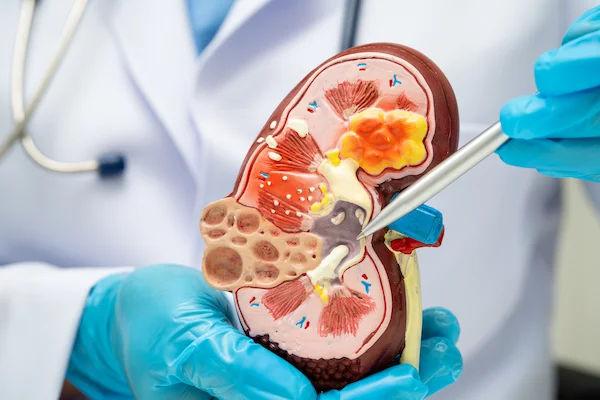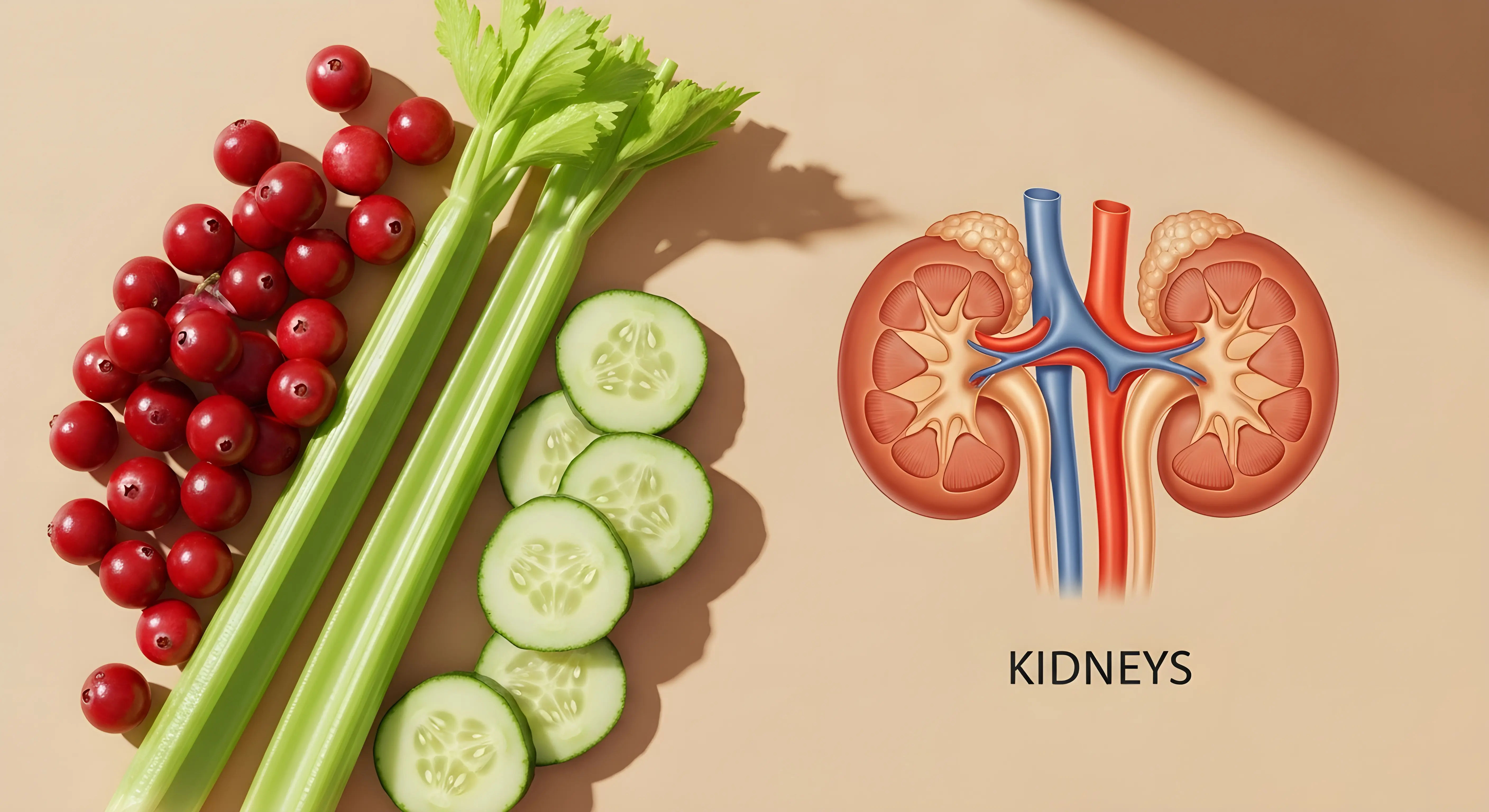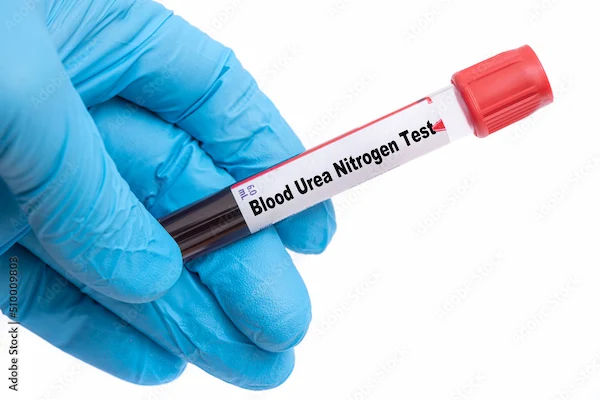Your Diet Guide to Preventing Painful Kidney Stones
Know about the diet guide to prevent kidney stones. what it is, how they are formed, the main cause, the role of hydration, calcium connection, the role of protein & dairy products and more.

Written by Dr. Siri Nallapu
Reviewed by Dr. Rohinipriyanka Pondugula MBBS
Last updated on 13th Jan, 2026
.webp?tr=q-80,f-webp,w-350,dpr-2,c-at_max 700w)
Introduction
Kidney stones are more than just a painful experience; they're a sign that your body's chemistry is out of balance. If you've ever suffered from one, you know the intense discomfort and are likely motivated to prevent a recurrence. For those who haven't, proactive prevention is key. The good news is that dietary guidelines play a monumental role in managing your risk. This article demystifies the nutritional strategies to keep your kidney health in optimal condition. We'll move beyond simplistic "eat this, not that" lists and explore the science of how food affects stone formation, providing you with a practical and sustainable dietary plan. By understanding the "why" behind the guidelines, you can make empowered choices to protect your kidneys for life.
What Are Kidney Stones and How Do They Form?
Kidney stones are hard deposits made of minerals and salts that crystallise inside your kidneys. They form when your urine contains more crystal-forming substances like calcium, oxalate, and uric acid than the fluid in your urine can dilute. At the same time, your urine may lack substances that prevent crystals from sticking together, creating an ideal environment for kidney stones to form.
Consult a Nephrologist for Personalised Advice
The Most Common Culprit: Calcium Oxalate Stones
Approximately 80% of kidney stones are calcium-based, and the majority of those are calcium oxalate stones. This is why understanding oxalate, a natural compound found in many foods, becomes critical in any dietary prevention plan. It's a common misconception that the solution is to avoid calcium. In reality, the relationship is more nuanced, and the right balance of nutrients is the true key to prevention.
The Golden Rule: Hydration is Your Best Defense
This is the single most important piece of advice for preventing all types of kidney stones. Adequate fluid intake dilutes the substances in urine that lead to stones. It's the simplest and most effective dietary guideline you can follow.
How Much Water Should You Really Drink?
While the standard advice is 8 glasses a day, a better goal is to produce about 2.5 liters of urine daily. For most people, this means consuming at least 3 litres (about 13 cups) of fluid per day. Water is best, but citrus-based fluids like lemonade or orange juice offer an extra benefit.
Signs You're Well-Hydrated
The easiest indicator is the colour of your urine. Aim for light yellow or clear urine. Dark yellow urine is a sign that you need to drink more fluids, which is a primary risk factor for stone formation.
Navigating Oxalates: Friend or Foe?
Oxalates are not inherently evil, but they need to be managed. If you are at risk for calcium oxalate stones, your doctor may advise moderating high-oxalate foods.
High-Oxalate Foods to Moderate
- Spinach
- Rhubarb
- Almonds and cashews
- Miso soup
- Beets
- Swiss chard
- Sweet potatoes
- Raspberries
- Okra
The Calcium Connection: Why You Shouldn't Avoid Dairy
This is a crucial insight often missed. Low calcium intake can actually increase your risk of stones. Why? Calcium binds to oxalate in the intestines, preventing it from being absorbed into the bloodstream and eventually reaching the kidneys. The goal is to get enough calcium from food so it can do its job in the gut.
Smart Pairing: Combining Calcium and Oxalate Foods
Instead of having a high-oxalate smoothie for breakfast and a calcium-rich yoghurt for lunch, try having them together. For example, if you're eating spinach (high oxalate), pair it with a source of calcium like low-fat cheese in an omelette. This allows the binding to happen in your digestive system, not your kidneys.
Shake the Salt Habit: Sodium's Role in Stone Formation
A high-sodium diet is a major risk factor for kidney stones. Excess sodium in the urine prevents calcium from being reabsorbed from the urine to the blood. This causes high urinary calcium levels (hypercalciuria), which significantly increases the chance of calcium-based stones forming.
Hidden Sources of Sodium in Your Diet
Beyond the salt shaker, be wary of:
- Processed meats (deli meat, sausages, bacon)
- Canned soups and vegetables
- Fast food
- Condiments (soy sauce, ketchup, salad dressings)
- Packaged snacks (chips, crackers, pretzels)
- Aim for less than 2,300 mg of sodium per day, as per general dietary guidelines.
Rethinking Protein: Animal vs. Plant-Based
Diets high in animal protein (red meat, poultry, eggs, seafood) create a more acidic environment in the body and increase the levels of calcium and uric acid in the urine while reducing citrate, a stone inhibitor.
How Animal Protein Increases Kidney Stone Risk
Animal proteins are rich in purines, which break down into uric acid. High uric acid can form uric acid stones or act as a "seed" for calcium stones. Consider adopting a "Meatless Monday" or swapping a few animal protein meals each week for plant-based options like lentils, beans, or tofu, which have a lower impact on stone risk.
The Citrus Advantage: The Power of Citrate
Citrate is a natural inhibitor of kidney stones. It binds with calcium in the urine, preventing the calcium from crystallising with oxalate or phosphate.
Incorporating Lemonade and Other Citrate Sources
Lemons and limes are exceptionally high in citrate. A common recommendation is to drink half a cup of pure lemon juice diluted in water throughout the day or sugar-free lemonade. Orange juice is also a good source of citrate and potassium, which can help counter acid load.
Foods to Embrace: Your Kidney-Stone-Fighting Diet
Focus on building a diet rich in:
- Calcium-rich foods: Low-fat milk, yoghurt, and cheese (consume with meals).
- Fruits and vegetables: They make urine less acidic, which helps prevent stones. Melons, bananas, cucumbers, and cauliflower are great choices.
- Plant-based proteins: Lentils, peas, and beans.
- Whole grains: In moderation.
- Water: Your constant companion.
Sample One-Day Kidney-Stone-Prevention Meal Plan
- Breakfast: Oatmeal made with low-fat milk, topped with a handful of low-oxalate berries (blueberries, strawberries).
- Lunch: Large salad with grilled chicken (limit to 3oz), lots of low-oxalate veggies (cucumbers, carrots, lettuce), and a yoghurt-based dressing. A whole-grain roll on the side.
- Snack: An apple and a small wedge of low-fat cheese.
- Dinner: Baked salmon (4oz) with a side of steamed cauliflower and a quinoa pilaf.
- Beverages: Water throughout the day, and a large glass of sugar-free lemonade with lunch and dinner.
Conclusion
Preventing kidney stones doesn't require a drastic or overly restrictive diet. It's about strategic balance and understanding how the foods you eat interact inside your body. By prioritizing relentless hydration, combining nutrients intelligently (like calcium and oxalate), and shifting towards a diet lower in sodium and animal protein, you can significantly alter your urinary chemistry to be less hospitable to stones. These dietary guidelines are not just a temporary fix but a blueprint for long-term kidney health and overall wellness. Remember, consistency is key. Start by incorporating one or two changes at a time, and build from there. If you have a history of kidney stones or are at high risk, consult a doctor online with Apollo24|7 to create a personalised prevention plan tailored to your specific needs and stone type.
Consult a Nephrologist for Personalised Advice
Consult a Nephrologist for Personalised Advice

Dr. Manju Kamal
Nephrologist
12 Years • MBBS,MD(General Medicine), DNB,DM(Nephrology)
Angamaly
Apollo Hospitals Karukutty, Angamaly

Dr. Boddanapu Mastan Valli
Nephrologist
9 Years • M.D, D.M.
Nellore
Apollo Speciality Hospitals, Nellore
Dr. Nithyashree Nandagopal
Nephrologist
10 Years • DNB (Gen Med), DNB (Nephrology)
Chennai
Apollo Hospitals Greams Road, Chennai
(275+ Patients)

Dr. Pardha Saradhi
Nephrologist
9 Years • MBBS, MD-DNB (Gen. Med.), DNB (Nephro)
Hyderabad
Apollo Hospitals D R D O kanchanbagh, Hyderabad
(75+ Patients)

Dr. Kity Sarkar
Nephrologist
15 Years • MBBS,MD(Genl. Med.), DrNB(NEPHROLOGY)
Kolkata
Dr. Kity Sarkar's Clinic, Kolkata
Consult a Nephrologist for Personalised Advice

Dr. Manju Kamal
Nephrologist
12 Years • MBBS,MD(General Medicine), DNB,DM(Nephrology)
Angamaly
Apollo Hospitals Karukutty, Angamaly

Dr. Boddanapu Mastan Valli
Nephrologist
9 Years • M.D, D.M.
Nellore
Apollo Speciality Hospitals, Nellore
Dr. Nithyashree Nandagopal
Nephrologist
10 Years • DNB (Gen Med), DNB (Nephrology)
Chennai
Apollo Hospitals Greams Road, Chennai
(275+ Patients)

Dr. Pardha Saradhi
Nephrologist
9 Years • MBBS, MD-DNB (Gen. Med.), DNB (Nephro)
Hyderabad
Apollo Hospitals D R D O kanchanbagh, Hyderabad
(75+ Patients)

Dr. Kity Sarkar
Nephrologist
15 Years • MBBS,MD(Genl. Med.), DrNB(NEPHROLOGY)
Kolkata
Dr. Kity Sarkar's Clinic, Kolkata
More articles from Diet for Kidney Disease
Frequently Asked Questions
Is spinach bad for kidney stones?
Spinach is very high in oxalates. If you are prone to calcium oxalate stones, it's wise to moderate your intake. The key is not to eat it alone. Always pair it with a calcium source like dairy to bind the oxalate in your gut.
How much lemon water should I drink to prevent stones?
common recommendation is the juice of two lemons (about 4-5 tablespoons) diluted in water throughout the day. It's best to avoid adding sugar, as sugar can increase stone risk. For a precise recommendation based on your health, consult a doctor on Apollo24|7.
Can I still eat nuts on a kidney stone diet?
Some nuts, like almonds and cashews, are high in oxalates. However, peanuts, walnuts, and pecans are lower. You can enjoy them in small portions (a small handful) and avoid making them a daily staple if you are at high risk.
Does alcohol cause kidney stones?
Alcohol can contribute to dehydration, which is a primary risk factor for stone formation. If you drink alcohol, do so in moderation and ensure you compensate with even more water.
I'm taking calcium supplements. Is that a problem?
It can be. Calcium from supplements should be taken with meals to help bind oxalates, but it's crucial not to exceed the recommended dose. It's generally better to get calcium from food sources. Always discuss supplement use with your doctor.


